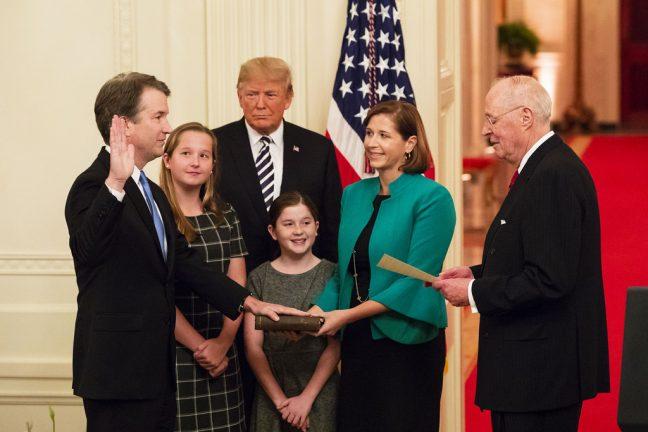Watching Kavanaugh’s confirmation to the Supreme Court, Rep. Chris Taylor, D-Madison was disgusted and upset.
Taylor said she felt like a first-year law student again, watching Anita Hill bring forward allegations of sexual misconduct against Supreme Court Justice Clarence Thomas.
“Actually, I don’t think that Dr. Ford even got what Anita Hill got,” Taylor said. “She didn’t get a full investigation. So, it underscores for us as elected officials, as progressive women, the inequity we see every single day.”
There are some key distinctions between the two cases: For one, a nominee has never accused party leaders of being out to get them, suggested a conspiracy or asked senators questions at a committee hearing, University of Wisconsin political science professor Barry Burden said.
In an email to The Badger Herald, Charlie Mueth, Chair of UW College Republicans defended Kavanaugh’s behavior.
“Kavanaugh’s demeanor in the hearing was completely appropriate,” Mueth said. “By trying to destroy a man’s career with uncorroborated allegations, a man should be able to defend himself as Kavanaugh did valiantly.”
But other affiliates weren’t so forgiving.
Professor of law Martha Gaines was one of more than 2,400 law professors to sign a petition against Kavanaugh’s confirmation that was published by the New York Times.
Gaines said she signed the petition not only because of Kavanaugh’s demeanor during the hearing but also because she believes he made untrue statements about his behavior and drinking in high school and college.
“I think it’s pretty clear that he lied, and I think that is a disqualifying factor all by itself,” Gaines said. “I think his decorum — or lack thereof — and his demeanor, his lack of judiciousness and that he lost his cool by his own admission was unacceptable as well. You don’t normally get to get a job and then apologize for how you behaved in the interview.”
A recent survey also indicated that public opinion of Kavanaugh may be different than it was for Clarence Thomas during his investigation.
The Elections Research Center, which Burden is the director of, partnered with Vox to survey and compare the attitudes of Americans in 1991 during Clarence Thomas’ confirmation versus the attitudes of present-day Americans.
The questions were the same as in 1991. For instance, both asked, “all in all, do you approve or disapprove of the way that the Senate handled the confirmation hearings?” Seventy-three percent disapproved during Kavanaugh’s, while 68 percent disapproved during Thomas’.
According to the survey, the hearings had a more negative effect on views of President Donald Trump than they did on President George H.W. Bush. Forty-two percent of Americans said they had less confidence in Trump as a result of the hearings, while only 30 percent of Americans said the same about Bush, with 34 percent of pollers saying they had gained more confidence in Bush.
In 1991, 67 percent of Americans said they would not be more or less likely to vote to re-elect a U.S. senator if they voted in favor of Justice Thomas. In the present day, only 28 percent of Americans said their senator’s vote would have no impact.
“That’s a pretty dramatic shift,” Burden said.
Polling data reported by NPR showed that the number of Republican voters who said the November elections are “very important” have spiked. In July, 78 percent of Democrats and 68 percent of Republicans felt this way, but this margin has since closed to 82 percent and 80 percent, respectively.
Burden said Democratic voters were already engaged at a high level before Kavanaugh’s confirmation, so there wasn’t much further that their numbers could rise. But among Republican voters, the confirmation battle was energizing and may have reminded conservatives what is at stake in the coming election, Burden said.
Along with other issues, the Senate’s Kavanaugh hearing “awakened” many Republicans, Meuth said.
“Republicans are doing even better in the polls because many have realized the Democrats in Congress do not accurately support them,” Meuth said. “Also, many are frustrated with the way that the Senate Judicial Committee handled the process and want to see stronger leadership from our Senators.”
While Kavanaugh is likely to be on voters’ minds on election day, the degree to which that stays in front of voters may change as other issues take precedence, Burden said.
Taylor said Kavanaugh’s confirmation has promoted activism among woman in her district who may have been left-leaning, but may not have taken an active role. Taylor also said although some people have brought up Kavanaugh, most people she has talked to while knocking on doors have been preoccupied with other issues.
“I think people are more worried about getting by, paying their mortgage, making sure their kids have opportunities, that their community is thriving,” Taylor said. “So that seems to be more on the minds of people that I’m talking to.”
Burden said UW students are likely to understand that the decisions of the Supreme Court can have a significant impact on their lives, such as immigration policy, the Affordable Care Act and voting rights, among other issues.
This will give students another reason to turn out to the polls, Burden said.
The issue of redistricting in Wisconsin will likely go back to the Supreme Court sometime next year, and with another conservative-leaning justice, the court will probably be reluctant to strike down the redistricting in Wisconsin, Burden said.
Whatever their politics may be, Gaines said she hopes all students become more politically active.
“What you want is a vibrant citizenry,” Gaines said. “So that’s first and foremost.”
However the election plays out, Burden said the impact on the Supreme Court and concerns over Kavanaugh’s temperament will linger.
Mueth disagreed.
“I have confidence that many will begin to see the strength of Kavanaugh as a judge immediately,” Mueth said. “His talent as a judge who upholds the Constitution juxtaposes him from many modern activist judges who act like legislators from the bench.”


